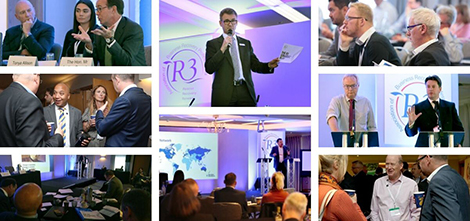
Inside R3’s Northern Conference
27 September 2019
The North West may have a reputation for gloomy skies, but delegates arriving at the Cottons Hotel near Knutsford for the R3 Northern Conference 2019 were treated to bright sunshine, before a lively networking dinner on the Thursday evening, hosted at the hotel.
The next morning’s programme started with an introduction from R3 North West Committee Chair Paul Barber, a partner at Begbies Traynor in Manchester, who ran through the larger issues facing the Northern economy, which he described as highly varied and subject to huge amounts of change, from Brexit to online disruption to companies’ business models.
Paul then introduced the first session, an explanation of R3’s Strategic Plan, presented by R3 CEO Emma Lovell and R3 President 2019-20, Duncan Swift, a partner at Moore. Emma and Duncan set out the five pillars underpinning the plan: community (making sure R3 is the ‘home’ for all members of the profession and the wider insolvency and restructuring community, at every stage of their careers); voice (promoting and protecting the value of members’ work, through media and political outreach, among other channels); learning (providing market-leading education and training for the profession); innovation and insight (producing research and providing a forum for discussion of insolvency and restructuring issues); and ensuring that R3 will continue to be a thriving organisation (building for the future by revising R3’s governance, and taking advantage of new technology and improved business processes).
With a renewed focus on standards across the professional services sector, the panel discussing ethics – with Tonya Allison of FRP Advisory, the Hon. Mr Justice Snowden, and Bob Pinder of ICAEW, chaired by Duncan Swift – had a lot to talk about. Judge Snowden observed that insolvency and restructuring cases rely on trust between the judge and the insolvency practitioner, with all parties working together to try and get the best outcome for creditors. Bob Pinder talked from the perspective of a regulator, saying that professionalism should be a way of life, not just a set of rules, and that education for the profession was key for ICAEW. Tonya Allison spoke as a relatively newly qualified insolvency professional, sharing her experiences in her career so far, with potential conflicts of interest the ethical challenge she had encountered most frequently to date.
The North of England – especially the North West – is known for its deep love of football, and the talk from Matt Dunham of Dunham Dean Advisory and Neil Smyth of Mills & Reeve on football clubs in crisis could not have been more timely. Neil and Matt discussed cases of football club insolvencies they had been involved with as advisors, along with the underlying reasons why many clubs have run into trouble in the past, and in the present day. Both gave their view that more robust monitoring of clubs’ finances is needed, in order to give clubs the best possible chance of survival by taking action at an earlier stage.
After the coffee break, Brian Sloan from the Bank of England’s North West panel gave delegates an overview of the current state of the economy, showing how global trends feed through to local areas, with uncertainty in the world economy filtering down. Brian noted that stock-building activity in Q1 2019 had unwound in Q2, but he had not yet seen companies in the North West rebuilding their stock levels in Q3 ahead of the October 31 Brexit deadline, while the labour market has remained strong, although uncertainty is dampening pay growth.
R3’s Technical and Education Director Caroline Sumner set out what has happened since the introduction of the General Data Protection Regulation in May 2018, and specifically how it has affected the insolvency and restructuring profession. While the pre-GDPR scare stories about enormous fines have yet to materialise, Caroline emphasised that there are still many considerations for office holders, especially around responding to Subject Access Requests made to an insolvent company.
Following a very chatty and sociable lunch, delegates heard two thematically linked talks: one from independent advisor John Tizard on the woes of public sector outsourcing companies, and one from the Insolvency Service’s Dave Chapman on the liquidation of Carillion in early 2018, both of which concluded that, while the public sector can outsource many of the risks of operating a particular service, in case of the insolvency of an outsourcing partner, the public sector still bears ultimate responsibility for ensuring that services continue to be provided.
In the afternoon session, Rory Dillon of Fletcher Bond gave a concise breakdown of recent cases of insolvency of property schemes, especially those operating via fractional sales to investors, and illustrated how the working environment for property developers had become less hospitable, with increased risks and lower returns.
The last session of the day was an interactive one, hosted by Paul Barber and Caroline Sumner, as they opened up the floor to delegates to give their thoughts on topics ranging from the future of insolvency practitioner regulation to what the North could do to reassert itself as a centre of economic activity and a counterbalance to London’s dominance. Audience members pointed out that the North has all of the professional expertise and the strong business ecosystem needed to help companies grow – but a lack of joined-up thinking, and crumbling infrastructure, are stopping the diverse regions which together make up the North from reaching their full potential. With hard questions being asked on the national stage about regional distribution of funding, and what can be done to help places which have fallen behind, some improvement may be on the way – but delegates were not holding their breath. At least the issue was being discussed, however, with an acknowledgement among the audience that – as in so many other areas – the status quo will have to change, for the good of the whole country, the North very much included.
With thanks to our sponsors:
- Gordon Brothers (main conference sponsors)
- Compliance on Call (drinks sponsors)
- Clumber Consultancy (golf sponsor)
- Apex Litigation Finance, Courts Advertising, Virtual Cabinet (exhibitors)
- Insolvency Risk Services, Manolete Partners Plc (key sponsorship partners)

R3 members can provide advice on a range of business and personal finance issues. To find an R3 member who can help you, click below.

 Stuart McBride
Stuart McBride Amelia Franklin
Amelia Franklin Lyle Horne
Lyle Horne
